- Home
- Tamora Pierce
Squire
Squire Read online
Table of Contents
Title Page
Dedication
Corus, the capital of Tortall; Summer, in the 17th year of the reign of Jonathan IV and Thayet, his Queen, 456 H.E. (Human Era)
one - KNIGHT-MASTER
two - THE KING’S OWN
three - CENTAURS
four - OWLSHOLLOW
five - THE GRIFFIN
six - LESSONS
seven - OLD FRIENDS
December, in the 17th year of the reign of Jonathan IV and Thayet, his Queen, 456
eight - THE PRICE OF A MAID
nine - MIDWINTER LUCK
Spring, in the 18th year of the reign of Jonathan IV and Thayet, his Queen, 457
ten - THE GREAT PROGRESS BEGINS
eleven - CLEON
Fall-Midwinter, in the 18th year of the reign of Jonathan IV and Thayet, his Queen, 457
twelve - TOURNAMENT
thirteen - THE IRON DOOR
fourteen - FRIENDS
In the 19th and 20th years of the reign of Jonathan IV and Thayet, his Queen, Spring 458-Spring 459
fifteen - TILT-SILLY
sixteen - THE NORTH
Summer, in the 20th year of the reign of Jonathan IV and Thayet, his Queen, 459
seventeen - THE KRAKEN
Winter, in the 20th year of the reign of Jonathan IV and Thayet, his Queen, 459
eighteen - ORDEAL
GLOSSARY
Acknowledgments
CAST OF CHARACTERS
Preview of the Lady Knight
1 - STORM WARNINGS
Copyright Page
To Ms. Gloria Barbizan and Ms. Dorothy Olding—
strong businesswomen long before women’s liberation
Jump attacked the intruder. Sparrows followed
like feathered brown darts, gouging the
newcomer’s face. Kel threw herself out of bed to
yank her glaive from the wall.
“Trollop, you killed my boy!” shouted the man who fought Jump and the birds. Kel pulled a shutter open, admitting cold air and early morning light—it was shortly after dawn. Jump gripped one of the man’s wrists in his jaws, drawing blood. The birds continued to strike his face and eyes as he flailed at them with his free hand.
Kel didn’t know this well-dressed, white-haired stranger. Neither did she know the woman and man who ran in to grab him, the woman clinging to his waist, the man with one hand on the stranger’s tunic as he tried to knock Jump away. . . .
“My nephew is dead,” the other stranger cried. “The Chamber of the Ordeal opened on his corpse.”
Corus, the capital of Tortall; Summer, in the 17th year of the reign of Jonathan IV and Thayet, his Queen, 456 H.E. (Human Era)
one
KNIGHT-MASTER
Despite the overflow of humanity present for the congress at the royal palace, the hall where Keladry of Mindelan walked was deserted. There were no servants to be seen. No echo of the footsteps, laughter, or talk that filled the sprawling residence sounded here, only Kel’s steps and the click of her dog’s claws on the stone floor.
They made an interesting pair. The fourteen-year-old girl was big for her age, five feet nine inches tall, and dressed informally in breeches and shirt. Both were a dark green that emphasized the same color in her green-hazel eyes. Her dark boots were comfortable, not fashionable. On her belt hung a pouch and a black-hilted dagger in a plain black sheath. Her brown hair was cut to earlobe length. It framed a tanned face dusted with freckles across a delicate nose. Her mouth was full and decided.
The dog, known as Jump, was barrel-chested, with slightly bowed forelegs. His small, triangular eyes were set deep in a head shaped like a heavy chisel. He was mostly white, but black splotches covered the end of his nose, his lone whole ear, and his rump; his tail plainly had been broken twice. He looked like a battered foot soldier to Kel’s young squire, and he had proved his combat skills often.
At the end of the hall stood a pair of wooden doors carved with a sun, the symbol of Mithros, god of law and war. They were ancient, the surfaces around the sun curved deep after centuries of polishing. Their handles were crude iron, as coarse as the fittings on a barn door.
Kel stopped. Of the pages who had just passed the great examinations to become squires, she was the only one who had not come here before. Pages never came to this hall. Legend held that pages who visited the Chapel of the Ordeal never became squires: they were disgraced or killed. But once they were squires, the temptation to see the place where they would be tested on their fitness for knighthood was irresistible.
Kel reached for the handle and opened one door just enough to admit her and Jump. There were benches placed on either side of the room from the door to the altar. Kel slid onto one, glad to give her wobbly knees a rest. Jump sat in the aisle beside her.
After her heart calmed, Kel inspected her surroundings. This chapel, focus of so many longings, was plain. The floor was gray stone flags; the benches were polished wood without ornament. Windows set high in the walls on either side were as stark as the room itself.
Ahead was the altar. Here, at least, was decoration: gold candlesticks and an altar cloth that looked like gold chain mail. The sun disk on the wall behind it was also gold. Against the gray stone, the dark benches, and the wrought-iron cressets on the walls, the gold looked tawdry.
The iron door to the right of the sun disk drew Kel’s eyes. There was the Chamber of the Ordeal. Generations of squires had entered it to experience something. None told what they saw; they were forbidden to speak of it. Whatever it was, it usually let squires return to the chapel to be knighted.
Some who entered the Chamber failed. A year-mate of Kel’s brother Anders had died three weeks after his Ordeal without ever speaking. Two years after that a squire from Fief Yanholm left the Chamber, refused his shield, and fled, never to be seen again. At Midwinter in 453, months before the Immortals War broke out, a squire went mad there. Five months later he escaped his family and drowned himself.
“The Chamber is like a cutter of gemstones,” Anders had told Kel once. “It looks for your flaws and hammers them, till you crack open. And that’s all I—or anyone—will say about it.”
The iron door seemed almost separate from the wall, more real than its surroundings. Kel got to her feet, hesitated, then went to it. Standing before the door, she felt a cold draft.
Kel wet suddenly dry lips with her tongue. Jump whined. “I know what I’m doing,” she told her dog without conviction, and set her palm on the door.
She sat at a desk, stacks of parchment on either side. Her hands sharpened a goose quill with a penknife. Splotches of ink stained her fingers. Even her sleeves were spotted with ink.
“There you are, squire.”
Kel looked up. Before her stood Sir Gareth the Younger, King Jonathan’s friend and adviser. Like Kel’s, his hands and sleeves were ink-stained. “I need you to find these.” He passed a slate to Kel, who took it, her throat tight with misery. “Before you finish up today, please. They should be in section eighty-eight.” He pointed to the far end of the room. She saw shelves, all stretching from floor to ceiling, all stu fed with books, scrolls, and documents.
She looked at her tunic. She wore the badge of Fief Naxen, Sir Gareth’s home, with the white ring around it that indicated she served the heir to the fief. Her knight-master was a desk knight, not a warrior.
Work is work, she thought, trying not to cry. She still had her duty to Sir Gareth, even if it meant grubbing through papers. She thrust herself away from her desk—
—and tottered on the chapel’s flagstones. Her hands were numb with cold, her palms bright red where they had touched the Chamber door.
Kel scowled at the iron door. “I’ll do my duty,” she told the thing, shive
ring.
Jump whined again. He peered up at her, his tail awag in consolation.
“I’m all right,” Kel reassured him, but she checked her hands for inkspots. The Chamber had made her live the thing she feared most just now, when no field knight had asked for her service. What if the Chamber knew? What if she was to spend the next four years copying out dry passages from drier records? Would she quit? Would paperwork do what other pages’ hostility had not—drive her back to Mindelan?
Squires were supposed to serve and obey, no matter what. Still, the gap between combat with monsters and research in ancient files was unimaginable. Surely someone would realize Keladry of Mindelan was good for more than scribe work!
This was too close to feeling sorry for herself, a useless activity. “Come on,” Kel told Jump. “Enough brooding. Let’s get some exercise.”
Jump pranced as Kel left the Chapel. She was never sure if he understood her exactly—it grew harder each year to tell how much any palace animal did or did not know—but he could tell they were on their way outside.
Kel stopped at her quarters to leave a note for her maid, Lalasa: “Should a knight come to ask me to be his squire, I’m down at the practice courts.” Gloom overtook her again. As the first known female page in over a century, she had struggled through four years to prove herself as good as any boy. If the last six weeks were any indication, she could have spared herself the trouble. It seemed no knight cared to take The Girl as his squire. Even her friend Neal, five years older than their other year-mates, known for his sharp tongue and poor attitude, had talked with three potential masters.
Kel and Jump left her room to stop by Neal’s. Her lanky friend lay on his bed, reading. Jump bounced up beside him.
“I’m off to the practice courts,” she said. “You want to come?”
Neal lowered his book, raising arched brows over green eyes. “I’m about to commence four years obeying the call of a bruiser on a horse,” he pointed out in his dry voice. A friend had commented once that Neal had a gift for making someone want to punch him just for saying hello. “I refuse to put down what might be the last book I see for months.”
Kel eyed her friend. His long brown hair, swept back from a widow’s peak, stood at angles, combed that way by restless fingers. Her fingers itched to settle it. “I thought you wanted to be a squire,” she said, locking her hands behind her back. Neal didn’t know she had a crush on him. She meant to keep it that way.
Neal sighed. “I want to fulfill Queenscove’s duty to the Crown,” he reminded her. “A knight from our house—”
“Has served the Crown for ages, is a pillar of the kingdom, I know, I know,” Kel finished before he could start.
“Well, that’s about being a knight. Squire is an intermediate step. It’s a pain in the rump, but it’s a passing pain. I don’t have to like it,” Neal said. “I’d as soon read. Besides, Father said to wait. Another knight’s supposed to show up today. I hate it when Father gets mysterious.”
“Well, I’m going to go hit something,” Kel said. “I can’t sit around.”
Neal sat up. “No one still?” he asked, kindness in his voice and eyes. For all he was five years older, he was her best friend, and a good one.
Kel shook her head. “I thought if I survived the big examinations, I’d be fine. I thought somebody would take me, even if I am The Girl.” She didn’t mention her bitterest disappointment. For years she had dreamed that Alanna the Lioness, the realm’s sole lady knight, would take her as squire. Kel knew it was unlikely. No one would believe she had earned her rank fairly if the controversial King’s Champion, who was also a mage, took Kel under her wing. In her heart, though, Kel had hoped. Now the congress that had brought so many other knights to the palace was ending, with no sign of Lady Alanna.
“There are still knights in the field,” Neal said gently. “You may be picked later this summer, or even this fall.”
For a moment she almost told him about her vision in the chapel. Instead she made herself smile. Complaining to Neal wouldn’t help. “I know,” she replied, “and until then, I mean to practice. Last chance to collect bruises from me.”
Neal shuddered. “Thanks,” he said. “I’ve gotten all the bruises off you this year that I want.”
“Coward.” She whistled for Jump, who leaped off the bed to follow her.
The practice courts were deserted. Lord Wyldon, the training master, had taken the pages to their summer camp earlier that week, ahead of the traffic that would clog the roads as the congress broke up. The combat teachers had gone with him; Kel saw only servants near the fenced yards where pages and squires practiced. She’d thought that older squires might come out to keep their skills sharp, but none were visible.
She saddled her big gelding, Peachblossom, murmuring to him as she worked. He was a strawberry roan, his cinnamon coat flecked with bits of white, his face, stockings, mane, and tail all solid red-brown. Except for the palace horse mages, he would tolerate only Kel. Abused when he was younger, Peachblossom was no man’s friend, but he suited Kel nicely.
Practice lance in hand, she guided Peachblossom to the tilting yard. There she studied the targets: the standard quintain dummy with its wooden shield, and a second dummy with a tiny black spot painted at the shield’s center. They were too solid to fit her mood. Though it was a windy June day, she set up the ring target, a circle of willow twigs hung from a cord attached to a long arm of wood. It was always the hardest to hit due to its lightness. Today it whipped on its cord like a circular kite.
Kel rode Peachblossom to the starting point and composed herself. It was no good riding at the ring target with an unsettled heart. Six years of life in the Yamani Islands had taught her to manage her emotions. She breathed slowly and evenly, emptying her mind. Her green-hazel eyes took on their normal, dreamy cast. Her shoulders settled; her tight muscles loosened.
Kel gathered her reins and resettled her lance. Part of the bargain she and her horse had made to work together was that Peachblossom would answer to verbal commands and Kel would never use the spur. “Trot,” she told him now.
The big horse made for the target at an easy pace. The ring flirted in the air. Kel lowered her fourteen-foot lance until it crossed a few inches above her gelding’s shoulders. The lead-weighted wood lay steady in her grip. Her eyes tracked the ring as she rose in the stirrups. On trotted Peachblossom, hooves smacking hard-packed dirt. Kel adjusted her lance point and jammed it straight through the ring. The cord that held it to the wooden arm snapped. Peachblossom slowed and turned.
With a hard flick—the movement took strength, and she had practiced until she’d gotten it perfect—Kel sent the ring flying off her lance. Jump watched it, his powerful legs tense. He sprang, catching the ring in his jaws.
A big man who leaned on the fence applauded. The sun was in Kel’s eyes: she shaded them to see who it was, and smiled. Her audience was Raoul of Goldenlake and Malorie’s Peak, knight and Knight Commander of the King’s Own guard. She liked him: for one thing, he treated her just as he did boy pages. It was nice that he’d witnessed one of her successes. The first time she’d seen him, she had been about to fall off a rearing Peachblossom. That her mount was out of control was bad; to have it witnessed by a hero like Lord Raoul, and ten more of the King’s Own, was far worse.
“I’d heard how well you two work together,” Lord Raoul said as Kel and Peachblossom approached. He was a head taller than Kel, with curly black hair cropped short, black eyes, and a broad, ruddy face. “I’m not sure I could have nailed that target.” Jump trotted over to offer the ring to the big knight. Raoul took it, tested its weight, and whistled. “Willow? I don’t think I could nail it—the ring I use is oak.”
Kel ducked her head. “We practice a great deal, that’s all, my lord. Jump wants you to throw it for him.”
With a flick of the wrist the knight tossed the ring, letting it sail down the road. Jump raced under it until he could leap and catch the prize. Holding his
tail and single ear proudly erect, he ran back to Raoul and Kel.
“Practice is the difference between winning and being worm food,” Raoul told Kel. “Do you have a moment? I need to discuss something with you.”
“I’m at my lord’s service.” Kel stood at ease, Peachblossom’s reins in her hand.
“I owe you an apology,” the knight confessed. “I’d meant to see you right after the big exams, but we were called east—ogres sneaked over the border from Tusaine. We just got back. If you haven’t accepted an offer from some other knight, would you like to be my squire?”
Kel blinked at him, unable to believe her ears. Over the last four years, when she hadn’t dreamed of serving Lady Alanna, she had slipped in a day-dream or two of being Lord Raoul’s squire. It wasn’t that far-fetched—the man had shown he had a kindness for her in the past—but when he didn’t visit after the big examinations, her daydreams had turned to dust. It had never occurred to her that he might have been called away. Palace gossip, usually accurate about who was in residence and who was not, had crumpled under the flood of guests for the congress.
Finally she blurted out, “But you never take a squire!”
Jump barked: Lord Raoul still held the willow ring. He flipped it into the air, straight up. Jump gave him a look, as if to say, Very funny, and waited until the ring was six feet from the ground before he leaped to catch it.
“Oh, all right.” Raoul sent the circle skimming across the training yard. Jump raced after it gleefully. To Kel Raoul said, “I had a squire once, about twenty years ago. Why don’t we sit”—he pointed to a nearby bench—“and I’ll explain.”
Kel followed him over and sat when he did. He took the ring from a victorious Jump and sent it flying again.
“See, I haven’t needed a squire since I joined the King’s Own.” The big man leaned back, stretching brawny legs out in front of him. He was dressed not in a courtier’s shirt, tunic, hose, and soft leather shoes, but in a country noble’s brown jerkin and breeches, a crimson shirt, and calf-high riding boots. He shifted so he could watch Kel’s face as they talked. “We have servants with the Own, and a standard-bearer, so my having a squire wasn’t an issue. But you know the Yamani princess and her ladies arrive next year.”

 Lady Knight
Lady Knight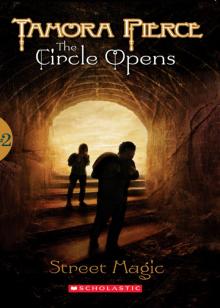 Street Magic
Street Magic Bloodhound
Bloodhound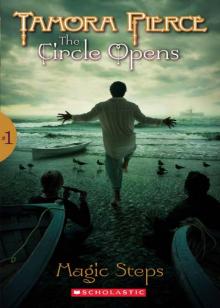 Magic Steps
Magic Steps Alanna: The First Adventure
Alanna: The First Adventure Emperor Mage
Emperor Mage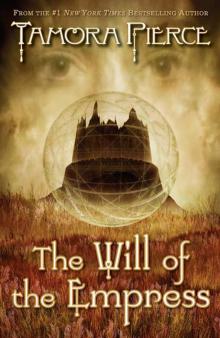 The Will of the Empress
The Will of the Empress The Realms of the Gods
The Realms of the Gods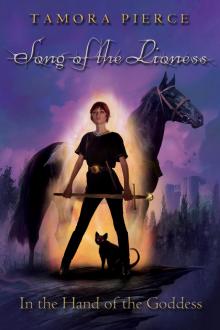 In the Hand of the Goddess
In the Hand of the Goddess Tris's Book
Tris's Book Cold Fire
Cold Fire Sandry's Book
Sandry's Book Wild Magic
Wild Magic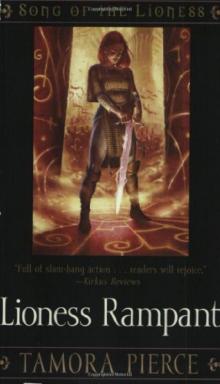 Lioness Rampant
Lioness Rampant The Woman Who Rides Like a Man
The Woman Who Rides Like a Man First Test
First Test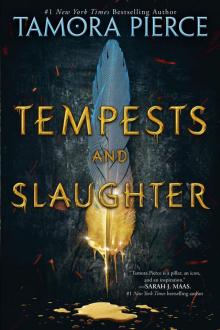 Tempests and Slaughter
Tempests and Slaughter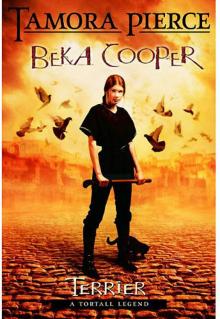 Terrier
Terrier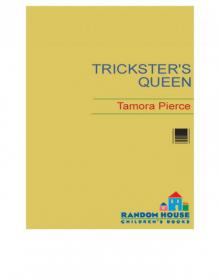 Trickster's Queen
Trickster's Queen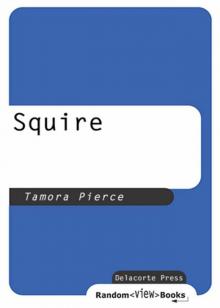 Squire
Squire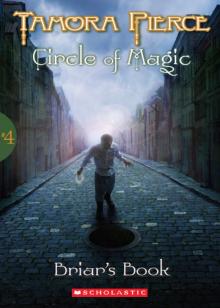 Briar's Book
Briar's Book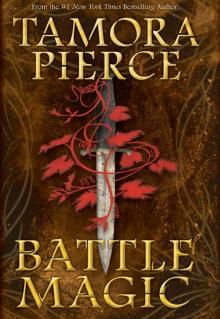 Battle Magic
Battle Magic Page
Page Melting Stones
Melting Stones Wolf-Speaker
Wolf-Speaker Mastiff
Mastiff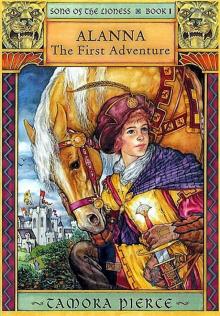 The Song Of The Lioness Quartet #1 - Alanna - The First Adventure
The Song Of The Lioness Quartet #1 - Alanna - The First Adventure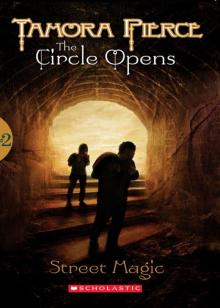 The Circle Opens #2: Street Magic: Street Magic - Reissue
The Circle Opens #2: Street Magic: Street Magic - Reissue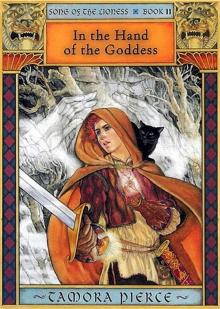 Tortall 1 - Song Of The Lioness #2 - In The Hand of the Goddess
Tortall 1 - Song Of The Lioness #2 - In The Hand of the Goddess Protector of the Small Quartet
Protector of the Small Quartet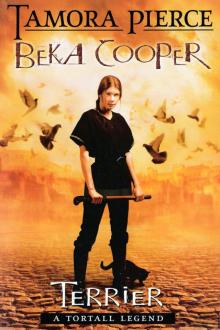 Beka Cooper 1 - Terrier
Beka Cooper 1 - Terrier Alanna
Alanna Trickster's Choice
Trickster's Choice Circle Opens #03: Cold Fire
Circle Opens #03: Cold Fire In the Hand of the Goddess (The Song of the Lioness)
In the Hand of the Goddess (The Song of the Lioness)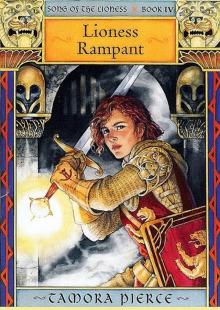 Song of the Lioness #4 - Lioness Rampant
Song of the Lioness #4 - Lioness Rampant Young Warriors
Young Warriors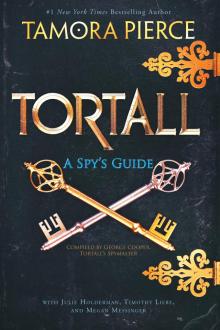 Tortall
Tortall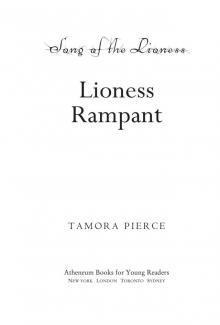 Lioness Rampant (Song of the Lioness)
Lioness Rampant (Song of the Lioness) Melting Stones (Circle Reforged)
Melting Stones (Circle Reforged) The Circle Opens #4: Shatterglass
The Circle Opens #4: Shatterglass